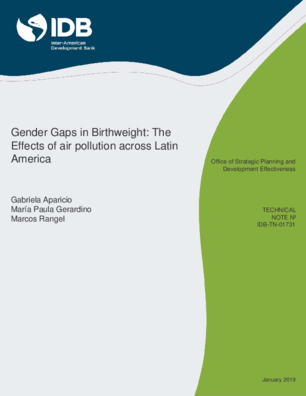Gender Gaps in Birthweight: The Effects of Air Pollution across Latin America
Date
Jan 2019
This paper looks at the effects of fetal pollution-exposure on birthweight and examines whether air pollution concomitant to economic development is indeed more harmful to male than female fetuses. We find that that a 10% increase in pollution exposure in-utero reduces the gender birth-weight gap by approximately 50 grams, equivalent to smoking 5 cigarettes a day while pregnant. Family fixed effects specification are employed to control for unobserved confounding factors such as family background. Several countries in the region are studied relying on comparable health survey data and satellite-based pollution data.




